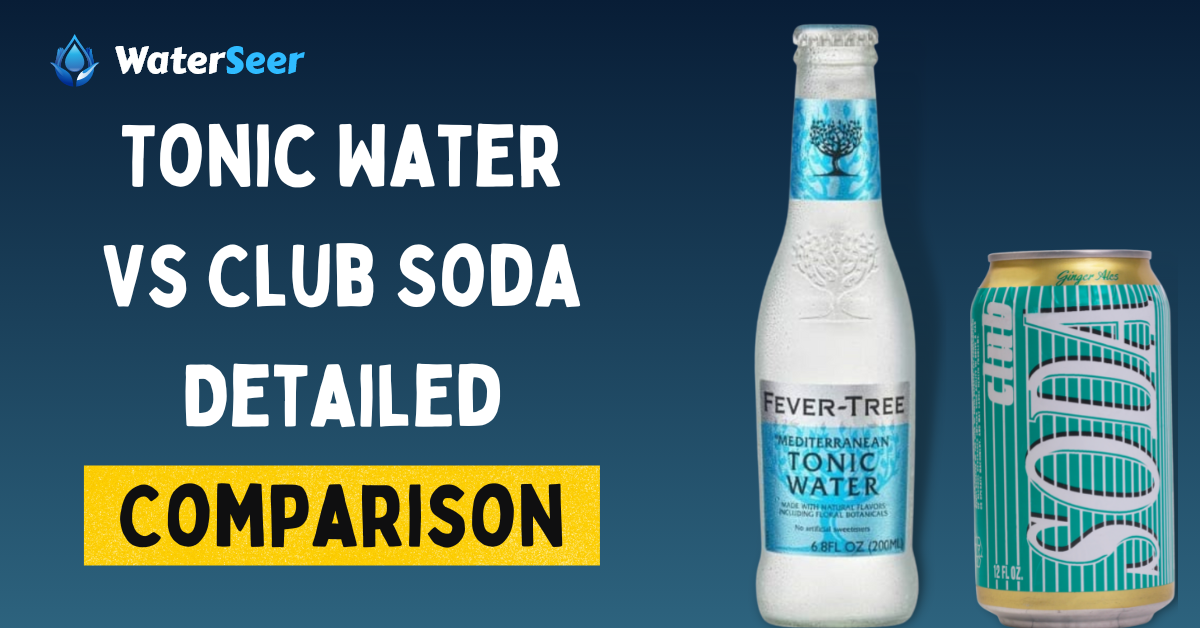Tonic Water vs. Soda Water: Exploring the Differences and Best Uses
When it comes to fizzy beverages, tonic water and soda water are two popular options that often confuse consumers due to their similar appearance. While they may look alike, there are distinct differences between tonic water and soda water in terms of taste, composition, and best uses. In this article, we will delve into the characteristics of each, providing clarity on the tonic water vs. soda water debate.

Tonic water vs club soda
I. Tonic Water: A Unique Bitter Sweetness
1. Composition: Tonic water is a carbonated beverage that contains quinine, a bitter compound derived from the bark of the cinchona tree. It is typically sweetened with sugar or high-fructose corn syrup and may include other flavoring agents.
2. Flavor Profile: The distinctive taste of tonic water is characterized by a bitter undertone from quinine, which is balanced by the sweetness of added sugars. This unique flavor profile sets tonic water apart from other carbonated beverages.
II. Soda Water: A Versatile and Refreshing Base
1. Composition: Soda water, also known as carbonated water or sparkling water, is made by dissolving carbon dioxide in water under pressure. It does not contain any additional flavorings or sweeteners, making it a pure and neutral base.
2. Flavor Profile: Soda water has a clean and crisp taste, providing a refreshing sensation on the palate. Its lack of added flavors allows it to serve as a versatile ingredient in various cocktails and mixed drinks.
III. Key Differences: Tonic Water vs. Soda Water
1. Taste: Tonic water has a distinct bitter-sweet taste due to the presence of quinine and added sweeteners. In contrast, soda water is flavorless, providing a purely effervescent experience without any added taste.
2. Usage: Tonic water is commonly used as a mixer in cocktails, particularly in classic drinks like the gin and tonic. Its unique flavor profile enhances the botanical notes of spirits. On the other hand, soda water is often used as a standalone beverage or as a base for mixed drinks, allowing other ingredients to shine without altering their original taste.
IV. Best Uses and Pairings
1. Tonic Water:
- Classic Cocktails: Tonic water is an essential ingredient in traditional cocktails like the gin and tonic, vodka tonic, and tequila tonic.
- Mocktails: Tonic water can be used in non-alcoholic beverages to provide a unique flavor twist and effervescence.
2. Soda Water:
- Refreshing Mocktails: Soda water serves as a refreshing base for mocktails, allowing the flavors of fruits, herbs, and syrups to shine.
- Hydration and Refreshment: Soda water can be enjoyed on its own as a thirst-quenching and calorie-free alternative to sugary beverages.
V. Health Considerations
1. Sugar Content: Consumers should be mindful of the sugar content in tonic water, as it can be relatively high due to added sweeteners. Opting for sugar-free or low-sugar options may be advisable for those watching their sugar intake.
2. Quinine: Tonic water contains a small amount of quinine, which historically was used to treat malaria. However, the quinine content in commercial tonic water

Tonic water vs soda water
Tonic water and soda water may share the same effervescent appearance, but their taste, composition, and best uses set them apart. Tonic water's unique bitter-sweet profile makes it ideal for classic cocktails, while soda water's neutral taste lends itself well to a wide range of beverages. Understanding the differences between tonic water and soda water allows consumers to make informed choices based on their preferences and intended usage, whether they're crafting a cocktail or seeking a refreshing thirst quencher.